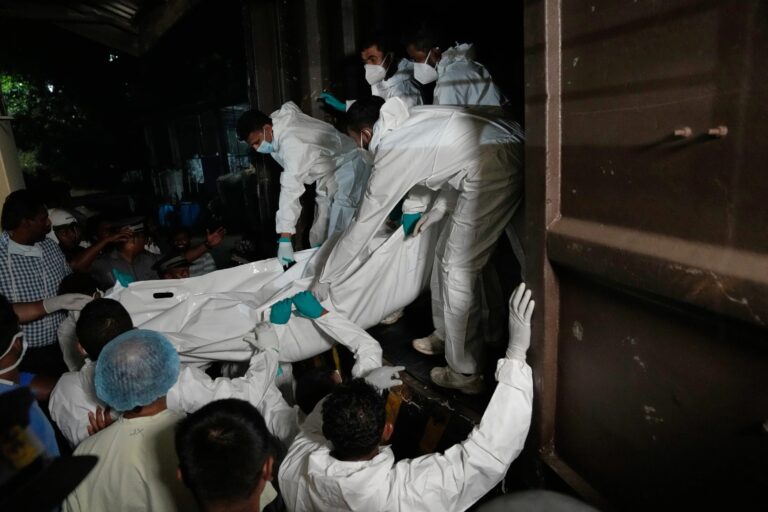 A group of esteemed Roshei Yeshiva and Rabbonim from across the Torah community spectrum met Monday afternoon to discuss problems that have come to light over recent years in the fulfillment of the minhag of Kapporos before Yom Kippur.
A group of esteemed Roshei Yeshiva and Rabbonim from across the Torah community spectrum met Monday afternoon to discuss problems that have come to light over recent years in the fulfillment of the minhag of Kapporos before Yom Kippur.
The meeting, which took place in the Novominsk beis medrash in Borough Park, focused on three areas of concern.
The first was the fact that the ever-increasing number of chickens used for the rite has put unprecedented pressure on the shochtim who are relied upon to ensure that the birds are properly slaughtered. What is more, there is no independent halachic oversight of the thousands of shechitos performed as parts of the public Kapporos that have become regular occurrences in many places of late. Since the chickens used for Kapporos are traditionally given to the Jewish poor, the importance of ensuring that the shechitos are properly performed is paramount.
A second focus of the Rabbonim was on the potential for the spread of disease, considering that chickens and their waste harbor bacteria like Salmonella that, if ingested, can cause serious sickness. Children in particular may not be aware of the importance of either wearing latex gloves or carefully and thoroughly washing their hands with anti-bacterial soap after touching the birds or their cages with bare hands. An infectious disease specialist was present at the meeting, at the organizers’ invitation, and made a presentation to the gathering.
The final concern discussed by the Rabbonim was the possibility that, in the hubbub that tends to attend mass Kapporos gatherings, the prohibition of tzaar baalei chaim – causing unnecessary discomfort or pain to animals – might be conmpromised by vendors or participants.
The Rabbonim discussed each issue at length and decided to delegate to a smaller group the responsibility of drawing up a list of guidelines for Kapporos, to be submitted to the entire group for their appraisal and, when approved, to be disseminated to the community at large – in time for this year’s Yomim Noro’im, habo’im oleinu li’chapara u’litova.











28 Responses
what about PETA?
the kaporos is a business, we are to be ashamed that it has become only abusiness, everyone is entitled to make a living but there is no mashgiach and the chillul hashem that is caused when the owner of the business leaves all the chickens to die and takes no resposibility for thier actions is shaming.
Feif Un, I think that the Rabbonim know that there is no merit to PETA – they are more concerened what these people are capable of doing. Take a look at what they did to Rubashkin…..
How about the fact that the same chickens are sold again and again while you thought it went to Tzedokoh? Or the fact that the fast buck artists amongst us use the various organizations name without authorization? How many times have we seen disclaimers from worthy Tzedokoh organiztions that proclaim that use of their names are not authorized-
While not belittling the minhag of Kapporos – I question wether our current mess is what has been practiced throughout the doros-
YW – Thank you for posting this encouraging information. There are actually not that many people involved in the Kapporos business. If I am correct there are maybe 10 or so “Kapporos Centers” in Boro Park, as well as proportionally similar numbers in other neighborhoods.
The oversight, if taken seriously, should not be that hard to do implement.
The problems mentioned in your article have always made me somewhat uncomfortable, and I would find these solutions very welcome. I think we would all look forward to being able to be mikayem this Minhag Kadmonim in the best way possible.
The Aruch Hashulchan and Chayei Adam specifically point to the exhausted shochet as a reason not to use chickens for kaparos. This problem is hundreds of years old. The Chayei Adam adds that the Minhag Kadminim is to use money. Let’s all be good litvakes and use $$ for kaparos.
Sometimes even PETA (spit three times) has a point.
Yes, they take things to far, and often seem to creepily care about animals more than people, but often, it is precisely (and only) the people who are driven, fanatical, and crazy who care enough to uncover abuses, be they with respect to cruelty to animals or in other areas.
Simply put, only the wackos care enough to document and publicize stuff like this, but the fact that they are wackos should not invalidate concrete information that they uncover.
The knee-jerk anti-PETAites need to realize that not every criticism of something done by Jews represents a criticism of Halacha and a nostalgia for Hitler. Schechita may be the most humane way to kill an animal, but perhaps there is NO humane way to kill animals at the high rate being carried out at for-profit factory farms. This is not a criticism of Shechita, but rather of the factory farming system generally. This ain’t the kindly Shochet in the Shtetl, my friends.
Perhaps raising an animal in a tiny pen from cradle to grave is unavoidably Tzar Ba’alei Chaim. Perhaps there is nothing wrong with shechting a chicken, but something very wrong with having it spend the last minutes/hours of its life hanging upside down on a conveyor belt, flapping its wings as it winds its way through the factory. We tend to focus on the last 3 seconds of an animal’s life, but not the previous three years.
When the words “Basar Ve’Dagim Ve’Chol Matamim” were composed, I assure you that there was no plant processing thousands of animals per day.
PizzaPizza – The Aruch Hashulchan and Chayei Adam are talking about the minhag to do Kapparos davka Erev Yom Kippur before Selichos, I am not sure that the same problem has to exist when we do Kapparos all of Aseres Yemie Teshuva.
“Let’s all be good litvakes and use $$ for kaparos.” If all you “good Litvaks” want to use money, that’s fine by me. It will make the crowds smaller for us non-litvaks.
We use fish . Thus reliving the schochet and the health issues.
basar v dagim
avibigcat is 100% right.
in the alte heim (boro park) we used to buy a leibedige kapparah (male for men/boys, female for women/girls) and see how the shoichet shechted the chicken. (that is part of the kapparah “ceremony”). then we did “al kisui dam b’ofer”. then we took the chicken home, and my father (or mother; of course, they’d fight over it, but my father ended up) cleaning the chicken. and my father would say this meal is xx’s kapparah, this meal is xx’s kapparah, etc.
today, no one knows what kisui dam b’ofer is. no one knows how to clean a chicken. (actually no one even knows how to take off the feathers from a chicken.)
today, as gemorakop says, they sell the same chicken over and over. and there are much more than ten of these “kapparah centers”.
as for pizzapizza, do you eat potatoes on pesach??? the aruch hashulchan forbids it!!
The people who do kapporos with these chickens should follow whatever the rabbonim paskened .Do they feel the emotion of kapporo and chait when they do it,or has it become just another social get together to do a ritual without internalizing the meaning behind it.
The chicken or fish used should be treated with respect as a living being.
Being one who has operated kapparah centers for the past 5 years. I can testify that the shochet that I get me chickens from gives money (a pidyon)to the poor instead of the actual chicken. Gloves were also available for all who wanted.
Last year, the Dept. of Agriculture distributed a list of approved poultry farms.
there is no validity to peta . like all missionaries they prey on people that have only little knoledge or no knowledge of the torah and the isssue on hand. chareidim writes a nice story, but his alliaance with peta yes spit four times is clear. in jis fith paragraph he writes on lie after another
1. chicken are not raised in cages. they are raised in large houses where they can roam as they please.
2.the chicken does not spend its last minutes/hours hanging upside down flapping its wings. the chicken is shechted first and is dead when it is processed further.
3. the chicken is usually 6 to seven weeks old when its shechted not three years old.
there is nothing wrong with shchita when its done al pi torah. in fact the same way you make a brocho before you put on tefilin a brocho is recited before the bird is shechted
SHECHITA IS A MITZVAH. GIVEN TO US BY G-D. BE carful who you are critisicing.
most important before you write KNOW SOMETHING.
chaim
Feif un – so they found one crazy bochur which they stuck on their video. Big deal!! Let me tell you – these PETA people will stop at nothing, and we have to make sure that our Minhagim won’t be trampled by these people!
CHAIMBA — No need for personal attacks. You may have misunderstood my post and I will attempt to clarify.
Chas V’Shalom would I criticize Schechita. And yes, I am aware of who commanded it. Thanks for filling me on on that one.
All I am saying is that there is a difference between Schechting one animal a day in your backyard and Shechting one thousand animals a day in a factory farm. Can one acknowledge the greatness of Shechita while criticizing the factory farming system? I say yes. Or at least maybe.
With respect to your numbered points, you’re welcome to watch the same footage I did re: points one and two. I’m not making anything up. As far as chickens living in large “houses,” one of the issues is that these animals live essentially their entire lives indoors, and you will not find a single expert–Frum or not–who says that this is ideal.
As far as the three years, I was obviously not referring to chickens. Cows are years, not weeks, old when they are Shechted. Also, I’m not sure if I understand your point (i.e. it’s ok to make animals suffer for weeks, but not years?).
Once again, a system that works fine for processing dozens/hundreds of animals a day may result in unavoidable Tzar Ba’alei Chaim if it is used to process many times that number. The problem is not with Shechita, but the fact that we are permitted to Shecht animals does not excuse any and all behaviour pre- and post-Shechita. I think that is very reasonable, and in no way disrespectful to Shechita or Halacha.
Very simply — perhaps factory farming (forget about Shechita for a moment) is simply incompatible with Halacha. Or perhaps our religion forbids us from harnessing a cud-chewing animal to a non-cud-chewing animal (the non-chewer will think it’s partner is eating and may be jealous), but permits us to poke a cow in the face (I will post the Agriprocessors video if you want) with an electric cattle prod. Could be– who knows?
Chareidim- please make up your mind what you want to critisize. you start with your critic on shchita and then switch to factory farming then back to shchita. this disscussion is about the holy minhag to shecht kaporos. the minhag is obviously about many jews who want to excesise their religious rights in a country that allows that expression. so much so that there seems there is a great demand for the service which people are willing to pay for. its not the vendors that are creating the demand but the customers that are requeting vendors to give them the opportunnity to do that mitzvah. as you surely know “Minhag yisroel torah hee”. here is where you the peta member steps in and wants to impose your beliefs on others by sheer misinformation and playing to peoples desire to be humane. which shchita is humane. so you start by cleverly writing something that is simply not true. when those untruths are pointed out you go to plan b which is clarification of what you said. had it not been pointed out then many people would have been misguided by your gross misinformation you posted.
i do not know what footage you are refering to but i will say clearly again.
the chickens are shected and are dead before they are processed. they do not hang for last mitutes/hours of their life . i am using your words which are clearly meant to mislead. and are you a rov in halacha that you can make statements about what you call factory farming?.
there is no rov that says that. the chicken that we eat are known as broilers they are not in cages as you wrote (of course you menat other than you wrote)but are placed in large barns to protect them from heat and cold. they are watered and fed and they have ample space to move around. period. maybe manhatan should be dismantled as it is inhumane to people. taking millons of people ann putting them is such a small space. and there are buildings being built to house more people. your reference about how many chicken are shechted is also made up. all chickens are shechted the way they are supposed to whether its one or ten . if many chickens are shechted then there are more shochtim. they rotate and do not stay on the line for the whole shift. they rest in many times during a shift. and finally your sarcaism about what our revered rabbis pasken is very evident in your whole farmishte posting. but i would expect anything different from a undercover peta member who is looking to veil their real agenda with words like tzaar baalei chaim etc. in the code of jewish law tzar baalei chaim is disscussed and its job of rabbonim with semicha to pasken what is and what is not tzaar baalei chaim. not you and not peta. we live in a country taht allowes us religeous freedom we need to protect that and fight off all those that seek to take that away
chaim
Feifun-there needs to be a distinction between what the minhag is and what some people do. peta is clearly out to invalidate shechita. they say that in their mission statement. they do not want anybody to own animals or work animals or kill animals. schita is a form of taking life from a animal to which they are opposed. so they are not invited to the discussion of the minhag of kapporos rather they seek to abolish that minhag. so they find a human error or fault and then blast the minhag.
we must defend our right of religeous expression.
its that simple. the rabbonim are doing what the rabbonim need to do and they need to be supported. they must not be apologetic.
may hashem bless with a good year and inscribe us in the book of life.
chaim
CHAIMBA — You’re missing the point but I said my piece. Other readers can take it or leave it (or accuse me of being an “undercover PETA member”) — I’m not offended either way.
You are 100% mistaken on the conditions chickens and other animals face at (yes, even kosher) plants, and while I can’t prove you wrong with text, take a look at the videos on various websites and then take your foot out of your mouth.
Mimidenat Hayam:
1) The Aruch Hashulchan refers to potato starch-not potatoes; and
2)not potatoes and
MiMedinat HaYam
1. The Aruch Hashulchan refers to potato starch -not potatoes.
2. The Aruch Hashulchan does not say it is assur to use potato starch ot that he doesn’t use it.
3. Mai Inyan Shmittah Eitzel Har Sinai?
I hope Peta goes out of business before the Beis Hamikdoshis is built, במהרה בימינו. Could you imagine the fuss they’ll make about the holy קרבנות? Will that put a damper on our שמחה just as it appears to be influencing our enthusiasm for the minhag of kapporos?
It may come as a surprise to many that PETA has actually spoken out in favour of Shechita (i.e. that it is more humane than other methods of slaughter).
Of course, they would prefer that no one eat animals, and perhaps even that the animals should eat us.
However, we can’t let knee-jerk defenses of abuses committed by Jewish companies govern our opinion on these matters.
chareidim,
there shpiel about shechita is to make it appear that they are not out to eradicate shechita even though they are. It is a PR gimick which you seem to have bought into.
As I said, PETA is out to eradicate all killing of animals. Like most, I believe that this is nuts.
It amazes me (although not so much anymore) that people will defend cruelty (not killing — cruelty) to animals before conceding that the nutjobs at PETA may have a small point to make.
Chareidim,
I am not defending cruelty to animals. I just believe that if we let PETA get its foot into the door to be the decider of how we should keep our minhagim, they will not stop but will keep pushing until they ban shechita entirely. We cannot concede one inch to those crazies.
It is up to rabbonim, not PETA and not the government, to oversee the practice of our religion, and to decide what is acceptible and what is not. Are there sometimes abuses? of course there are. But PETA cannot be given the ability to take advantage of those abuses to take control.
That aside, any Peta follower seen at a kaporos event should be hog tied and force fed beef or fish or something else that is high in protein in an attempt to restore some of his dead brain cells.
I’m encouraged to learn that the use of chickens in kapporos ceremonies was discussed by the Rabbonim earlier this week. Given that Torah-observant Jews can use money instead of live animals and that the Jewish tradition is filled with concepts, prayers and actions during the Rosh Hashanah-Yom Kippur period that stress the importance of compassion and sensitivity, we urge the Rabbonim to advocate that kapporos be carried out with money rather than chickens.
Thank you.
Karen Davis, PhD, President
United Poultry Concerns
757-678-7875
Edited by Site Moderation Panel: ( No links in comments allowed)
Dr. Davis,
You wrote “Given that Torah-observant Jews can use money instead of live animals…”
Well, that depends on an individual’s custom and in America we are all free to follow our religious customs. Some have the custom to use money, some to use fish and some to use chickens. These customs are hundreds if not thousands of years old.
Then you write “that the Jewish tradition is filled with concepts, prayers and actions during the Rosh Hashanah-Yom Kippur period that stress the importance of compassion and sensitivity”
Yes, but those same traditions and prayers also discuss at length the slaughter of animals which was done in the temple and were an integral part of the high holiday season. The reason they are not done today is not because it is inhumane but because our temple has been destroyed. Those same prayers express the wish, the prayer and the belief that the Messiah will come soon and restore those services as in the days of old.
Are the concepts of compassion and the concept of animal slaughter a contradiction? You obviously have the right to believe they are. Judaism does not share that belief though. Just as we do not attempt to force you to share our beliefs, we hope you will not attempt to force us, through government intervention, to accept yours. We hope that you will limit yourself to just urging rabbonim, as you said, and not to attempt to dictate to them how our religion should be practiced.
And just to be clear, I am not defending abuse such as chickens being left to die with no food and water etc. I am just defending our right to use chickens for kapporos.
Also, I am not a rabbi nor do I represent anyone other than myself, a simple jewish blogger who happens NOT to have the custom to use chickens for kapporos.